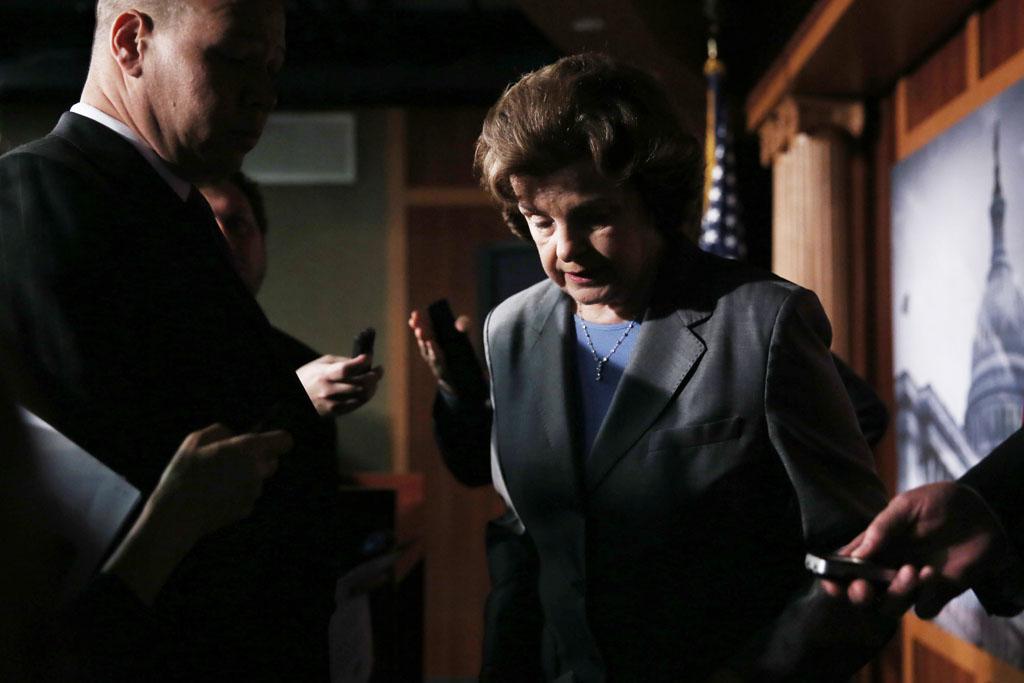NSA phone records surveillance ‘nothing new,’ say lawmakers
Chairman the US Senate Select Committee on Intelligence Sen. Dianne Feinstein (D-CA) answers questions from members of the media June 6, 2013 on Capitol Hill in Washington, DC. Feinstein and Chambliss spoke on the millions of Verizon customers phone records collecting by the NSA.
Lawmakers rushed to defend the National Security Agency's surveillance of millions of Americans' phone records on Thursday, saying the move was justified in the face of terrorist threats.
“We should just calm down and understand this is not something that is brand new,” said Senate Majority Leader Harry Reid (D-Nev.). "It's been going on for some seven years. And we've tried often to try to make it better, and we'll continue to do that."
“It is lawful. It has been briefed to Congress,” Senate Intelligence Chair Dianne Feinstein (D-Ca.) at an impromptu press conference in Washington, saying that the seized records are "just metadata" with "no content of a communication involved."
"I read intelligence carefully. And I know that people are trying to get to us," Feinstein said. "This is the reason we keep TSA doing what it’s doing. This the reason the FBI now has 10,000 people doing intelligence on counterterrorism. This is the reason for the national counterterrorism center that’s been set up in the time we’ve been active."
"And it’s to ferret this out before it happens,” she added. “It’s called protecting America."
"An individual has nothing to worry about … they have to prove to a judge that there's probable cause that you're involved in terrorism," Sen. Lindsey Graham (R-S.C.) said. "If we don't do it, we're crazy."
"On its face, the order reprinted in the article does not allow the Government to listen in on anyone's telephone calls," the National Security Council said in talking points sent to media and obtained by The Week.
Verizon also defended their decision to pass along millions of their clients' phone log records to the NSA.
“Verizon continually takes steps to safeguard its customers’ privacy," Randy Milch, Verizon’s general counsel, said in a letter to employees. "Nevertheless, the law authorizes the federal courts to order a company to provide information in certain circumstances, and if Verizon were to receive such an order, we would be required to comply."
More from GlobalPost: What is the NSA actually doing, anyway?
Not exactly, reported the National Journal. Verizon legally had another option to engage in what Marc Rotenberg, executive director of the Electronic Privacy Information Center, called "adversarial proceedings," AKA "a form of legal recourse that anyone who's served with a subpoena has access to."
However, Verizon and other companies are given liability protection by complying with government investigations. In other words, there's little if no incentive for them to protect the information.
Not all politicians were on board with the move. Al Gore tweeted his opposition to the surveillance, saying that "In digital era, privacy must be a priority. Is it just me, or is secret blanket surveillance obscenely outrageous?"
Senators Mark Udall and Ron Wyden have also been critical of the sweeping applications of the Patriot Act, and have reprised their opposition to the section of the legislation that justified the records seizure:
Every day, reporters and producers at The World are hard at work bringing you human-centered news from across the globe. But we can’t do it without you. We need your support to ensure we can continue this work for another year.
Make a gift today, and you’ll help us unlock a matching gift of $67,000!
